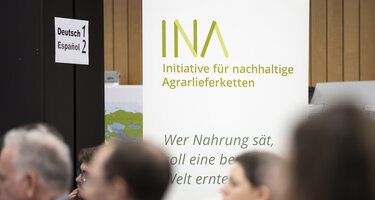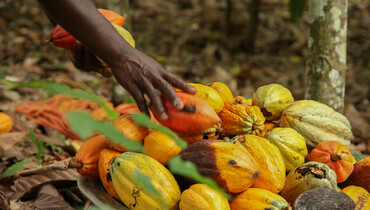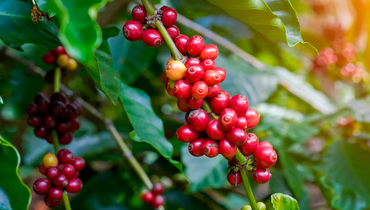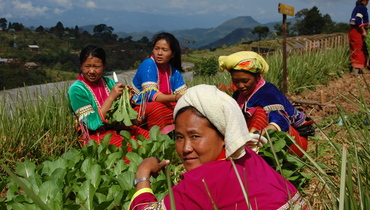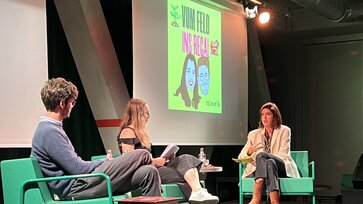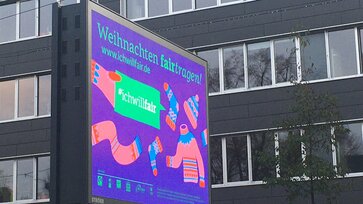Our History: From INA to SASI
In mid-October 2024, the Initiative for Sustainable Agricultural Supply Chains (INA) joined forces and expertise with the Global Programme Sustainability and Value Added in Agricultural Supply Chains (GV AgriChains) and the Fund for the Promotion of Innovation in the Agriculture and Food Sector (i4Ag) to become SASI, the Sustainable Agricultural Supply Chains Initiative. Together as SASI, we will continue to expand our range of services on agricultural supply chains and work on important cross-cutting issues such as deforestation, regulation, gender equality, living income and digitalisation as well as raw materials in global agricultural supply chains. AgriChains and i4Ag will also continue their work individually alongside this collaboration.
From INA to SASI
The Initiative for Sustainable Agricultural Supply Chains (INA) was launched in autumn 2018 at the request of the German Federal Ministry for Economic Cooperation and Development. The aim is to take a holistic view of global agricultural supply chains across various raw materials. To date, many commodities have been treated in isolation and in specific forums - even though the problems in many agricultural supply chains are similar. In an extensive stakeholder survey, two key issues crystallised: deforestation-free supply chains and living incomes and wages. On this basis, INA set itself the goal of achieving greater sustainability in global agricultural supply chains and improving the living conditions of smallholder farmers. In addition to numerous information formats, pilot projects are now being implemented. Projects were launched in Ethiopia, Colombia and West Africa with partners from the private sector, civil society and politics that now will be continued with SASI.

Regulation, digitalisation und gender as additonal key elements
As the INA developed over the years, so did its thematic focus. The topics of digitalisation, gender and regulation became more of a focus. For example, the INA team worked intensively on the legal anchoring of due diligence obligations and accompanied the development of the German Supply Chain Due Diligence Act as well as the European Deforestation Regulation (EUDR) and the European Corporate Sustainability Due Diligence Directive (CSDDD). The INA team also provided important impetus in the area of digitalisation of agricultural supply chains with the digital open source solution INATrace. Further forward-looking topics were initiated with interoperability and the ‘Digital Integration of Agricultural Supply Chains Alliance (DIASCA)’. Even before the introduction of feminist development policy, INA had already placed the issue of gender equality at the centre of its work and developed gender-transformative approaches in agricultural supply chains.
Competitions and tenders - promoting innovation in supply chains
In order to support particularly promising approaches to the fulfilment of corporate due diligence obligations, the INA has launched various funding opportunities. For example, the Due Diligence Fund and the Coffee Innovation Fund were launched as competitions and calls for proposals. Due to the increasingly close cooperation with the GIZ global project 'Sustainability and Value Added in Agricultural Supply Chains', further competitions and tenders have been realised.
#ichwillfair and podcast – new ways of communication
Since its launch, INA has been advising a growing specialist community with its extensive technical expertise. In order to reach consumers at the end of the supply chain, external communication has been expanded: the podcast 'Vom Feld ins Regal' and the Instagram channel #ichwillfair, Christmas campaigns and video clips have succeeded in drawing attention to fair and sustainable consumption.

Lunch break and cooperation with institutes of higher education – practical and with focus on specific target groups
In the event series "From the legal code to the agricultural supply chain: putting due diligence obligations into practice", also known as the 'INA Lunch break' due to its lunchtime format, INA conveyed to a large expert community that the implementation of due diligence obligations is feasible for everyone. Since autumn 2021, the series has actively supported the implementation of due diligence obligations in a practical way by presenting guidelines and manuals, best practices and contributions from partner countries.
Together with five German universities, INA implemented the 'Making Global Value Chains Sustainable' project. In each round, the project offers selected students a block seminar in Bonn and a study trip to Ghana. The aim is to sensitise young people to the fair and sustainable design of global supply chains while they are still at university and thus lay the foundations for their future careers.
Close cooperation and combined expertise
After many years of cooperation with the GIZ programmes 'Sustainability and Value Added in Agricultural Supply Chains' (GV AgriChains), the Fund for the Promotion of Innovation in Agriculture (i4Ag) and the Sustainable Agriculture for Forest Ecosystems (SAFE) project, we have been pooling our joint expertise since autumn 2024: as the Sustainable Agricultural Supply Chains Initiative (SASI), the INA projects will be continued and we are expanding our range of cooperation services in the field of global agricultural supply chains. This intensified cooperation enables us to draw on comprehensive expertise on various raw materials, projects and support options. This expertise is complemented by our extensive network of partners and partner countries. SASI's goal is green, fair and inclusive global agricultural supply chains.
